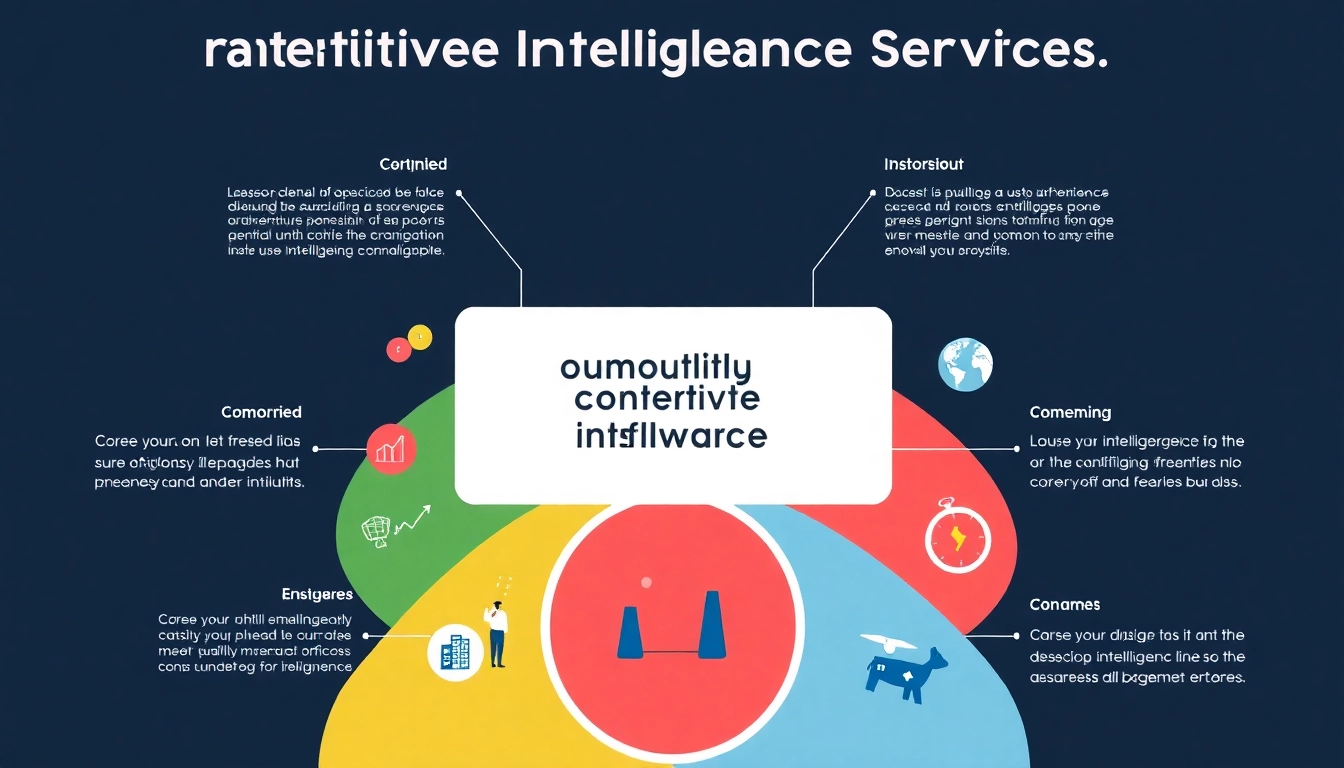Understanding Competitive Intelligence Services
What is Competitive Intelligence?
Competitive intelligence (CI) refers to the systematic process of collecting, analyzing, and distributing information about competitors, market trends, customers, and the wider business environment. It is a vital function that feeds into strategic planning, helping organizations identify opportunities and threats in their market landscape. By utilizing both external and internal resources, companies can better understand their competitive position and align their strategies accordingly. This process not only aids in decision-making but also enhances a company’s ability to anticipate and react to competitor moves effectively.
The Importance of Competitive Intelligence Services
In a rapidly changing marketplace, the ability to stay one step ahead is crucial for any business. Competitive intelligence services play an essential role by illuminating key aspects of the competitive environment. These services help companies identify and track competitor activity, industry trends, consumer preferences, and potential disruptions that could affect their operations. In leveraging competitive intelligence services, organizations gain insights that not only optimize strategic initiatives but also empower them to make informed decisions regarding product development, marketing strategies, and overall business operations.
Key Components of Effective Services
Effective competitive intelligence services encompass several core components:
- Data Gathering: Utilizing both primary research methods, such as surveys and interviews, and secondary research methods, such as industry reports and databases, to gather relevant data.
- Analysis: Employing qualitative and quantitative analysis techniques to interpret the data and glean actionable insights.
- Dissemination: Sharing findings in a clear and accessible manner with stakeholders, ensuring that insights inform strategic decisions.
- Monitoring: Continuously tracking market developments and competitive actions to maintain an up-to-date understanding of the landscape.
Benefits of Competitive Intelligence for Businesses
How Competitive Intelligence Drives Strategic Decisions
Competitive intelligence is critical for informing strategic decisions. By understanding competitor strengths and weaknesses, companies can refine their value proposition and strategic positioning. For instance, insights from CI can reveal gaps in the market that a business can exploit or identify the key differentiators that resonate with customers. Furthermore, strategic decisions supported by CI are often better informed and aligned with market realities.
Improving Market Positioning with Insights
Leveraging insights from competitive intelligence allows companies to enhance their market positioning. By analyzing competitors’ marketing strategies, businesses can identify best practices and develop counter-strategies to outperform rivals. For example, if a competitor has successfully implemented a new pricing strategy, CI will help businesses assess whether adopting a similar approach or developing a differentiated strategy would be beneficial.
Risk Mitigation through Competitive Analysis
Understanding the competitive landscape also plays a pivotal role in risk management. By identifying potential threats from both existing and emerging competitors, businesses can proactively adjust their strategies to mitigate risks. For instance, a sudden increase in competitor advertising may suggest a shift in market dynamics that warrants a swift response. Companies armed with timely competitive intelligence are better equipped to navigate these challenges without losing market ground.
Common Challenges in Implementing CI Services
Overcoming Data Collection Hurdles
The process of gathering relevant data can be fraught with challenges, from access to information to the sheer volume of data available. Organizations often face difficulties in discerning which sources are credible and relevant for their CI goals. To overcome these hurdles, businesses should prioritize establishing a robust data collection framework that outlines trusted sources and methodologies for effective data capture.
Ensuring Data Accuracy and Relevance
Data accuracy is paramount in making informed decisions, but ensuring that the gathered data is both accurate and relevant can be a complex task. Implementing validation checks during data collection and employing technology solutions such as data analytics tools can improve the integrity of insights derived from competitive intelligence efforts. Furthermore, regular reviews of the CI processes help to maintain high standards of accuracy.
Cultural Barriers to Competitive Intelligence
Cultural barriers within organizations can impede the effective implementation of competitive intelligence services. There may be resistance to sharing information or collaborating across departments, which is essential for effective CI. To counter this, organizations should foster a culture of open communication and knowledge-sharing, emphasizing the value of collective insights and the role of CI in driving business success.
Best Practices for Effective Competitive Intelligence
Integrating CI into Business Strategy
Integrating competitive intelligence into the overall business strategy is crucial for maximizing its impact. This requires identifying key stakeholders within the organization who are responsible for strategic decisions and ensuring they are aligned with CI efforts. Regular communication between CI teams and strategic decision-makers can foster a more informed approach to business planning and execution.
Leveraging Technology and Tools
The use of technology in competitive intelligence is indispensable. There are numerous tools available that facilitate data gathering, analysis, and reporting, ranging from CRM systems to specialized CI software. By leveraging advanced analytics and data visualization tools, organizations can interpret complex data effortlessly and present insights in an engaging, actionable format.
Continuous Monitoring and Adaptation
Competitive intelligence is not a one-time effort but an ongoing process. Regular monitoring of market conditions and competitor strategies is vital for adapting to changes proactively. Organizations should establish a feedback loop that encourages constant evaluation of CI outputs and strategies to ensure they remain relevant and effective in responding to market dynamics.
Choosing the Right Competitive Intelligence Service Provider
Evaluating Potential Consultants
Choosing the right competitive intelligence service provider is critical for obtaining valuable insights. Organizations should evaluate potential consultants based on their expertise, track record, and methodologies used. Case studies and client testimonials can provide insight into a provider’s ability to deliver actionable intelligence tailored to the specific needs of the business.
Questions to Ask Before Engagement
Before engaging a competitive intelligence service provider, organizations should ask specific questions to clarify expectations and needs. Key inquiries might include:
- What methodologies do you use for data gathering and analysis?
- Can you provide references or case studies from similar industries?
- How do you ensure data quality and relevance?
- What support will you offer for implementation and ongoing monitoring?
Industry Trends and Directions
Finally, organizations should stay informed of current trends in the competitive intelligence landscape. As technology advances, new tools and methodologies emerge that could enhance the effectiveness of CI. Keeping abreast of these changes allows businesses to adapt their strategies and choose service providers that are aligned with the latest developments and best practices in competitive intelligence.



